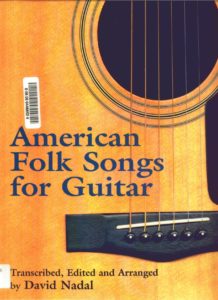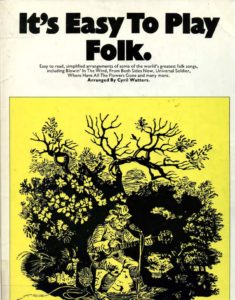Browse in the Library:
Or browse in the categories menus & download the Library Catalog PDF:
Pete Seeger: the 100 most inspiring musicians of all time
American singer Pete Seeger (b. May 3, 1919, New York, N.Y., U.S.) sustained the folk music tradition and was one of the principal inspirations
for younger performers in the folk revival of the 1960s.
Seeger was born to a musically gifted family. His father was the influential musicologist Charles Seeger, and his mother, Constance, was a violin instructor at Juilliard. But it was perhaps the introspective poems of his uncle, Alan Seeger, that most inspired Pete’s songwriting. Leaving
Harvard after two years in 1938, Seeger hitchhiked and rode freight trains around the country, gathering country ballads, work songs, and hymns and developing a remarkable virtuosity on the five-string banjo.
In 1940, he organized the Almanac Singers, a quartet that also featured the folksinger and composer Woody Guthrie, and appeared at union halls, farm meetings, and wherever his populist political sentiments were welcome. The group disbanded soon after World War II.

In 1948, he formed another group, the Weavers—with Lee Hays, Ronnie Gilbert, and Fred Hellerman—which achieved considerable success on college campuses, in concert, and on several records. Shortly after the group achieved national fame, however, a great deal of controversy was stirred up concerning Seeger’s previous activities in left-wing and labour politics, and the Weavers suddenly found themselves blacklisted by much of the entertainment industry. Finding it increasingly difficult to make concert bookings or to sell records, the group broke up in 1952 but
reunited three years later when a Christmas concert at Carnegie Hall sparked new interest in their music and message. Seeger left the group in 1958, and it disbanded in (The Weavers gave two reunion concerts in 1980,
and a motion picture documentary about the group, Wasn’t That a Time!, was released in 1982.)
After the 1950s, Seeger usually worked alone or with his family (brother Mike was a member of New Lost City Ramblers; sister Peggy, a singer and multi-instrumentalist, became one of the driving forces behind the British folk music revival with Ewan McColl, her partner in life and in music making). As a solo performer, Seeger was still a victim of blacklisting, especially after his 1961 conviction for contempt of Congress stemming from his refusal in 1955 to answer questions posed to him by the House Committee on Un-American Activities concerning his political activities.
Although Seeger’s conviction was overturned the following year in an appeal, for several years afterward the major networks refused to allow him to make television appearances. In later years, the controversy surrounding the performer gradually subsided. A beloved fixture at folk festivals, Seeger was given major credit for fostering the growth of the hootenanny (a
gathering of performers playing and singing for each other, often with audience participation) as a characteristically informal and personal style of entertainment. Among the many songs that he wrote himself or in collaboration with others were “Where Have All the Flowers Gone,” “If I
Had a Hammer,” “Kisses Sweeter Than Wine,” and “Turn, Turn, Turn.” His The Incomplete Folksinger (1972) is a collection of his writings on the history of folk songs, civil rights, and performers in his lifetime.

In the 1970s and ’80s he was active in a program to remove pollution from the Hudson River, building the Hudson River sloop Clearwater, promoting festivals for its maintenance, and engaging in environmental demonstrations, particularly antinuclear ones. During this period Seeger also performed regularly with singer-songwriter Arlo Guthrie, Woody Guthrie’s son. By the 1990s, Seeger had transcended the accusations of the McCarthy era, and he was regarded as a cherished American institution. The motto inscribed on his banjo—“This machine surrounds hate and forces it to surrender”—seemed to have been proven correct.
In 1994, he was awarded a National Medal of Arts, the first of many honors that he received as the century approached its turn. Seeger was inducted into the Rock and Roll Hall of Fame in 1996, and the following year he received his first Grammy Award, for Pete (1996). In 2009, he won a second Grammy, for a collection that found the artist approaching his 90th birthday with undiminished spirit and hope. Seeger’s “musical autobiography” Where Have All the Flowers Gone was published in 1996.
Best site for sheet music download is right here.
Pete Seeger – Greatest Hits (FULL ALBUM – BEST AMERICAN FOLK MUSIC)
TRACKLIST
01- Go in and Out the Window 00:11 02- Little Sally Walker 02:39 03- I’ve Been Working on the Railroad 04:15 04- BobA-Needle 06:08 05- Bought Me A Cat 07:32 06- Mary Wore Her Red Dress 10:46 07- Rye Whiskey 12:57 08- Skip to My Lou 15:15 09- Soon as We Cook Sweet Potatoes 18:24 10- All Around the Kitchen 21:56
11- Billy Barlow 24:00 12- Clap Your Hands 26:38 13- Frog Went A-Courting 29:39 14- Jim Along Josie 34:04 15- Jim Crack Corn 36:12 16- Shell Be Coming Round the Mountain 38:30 17- The Train Is A-Coming 40:27 18- There Was a Man and He Was Mad 43:36 19- This Old Man 45:22 20- This land is your land 48:00
Pete Seeger – GREATEST HITS (FULL ALBUM)
